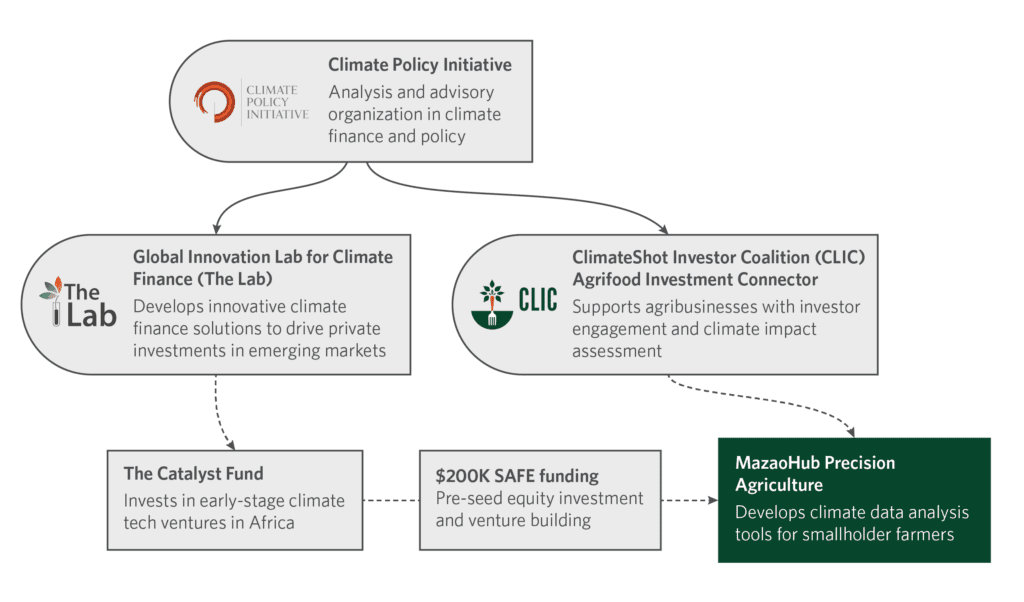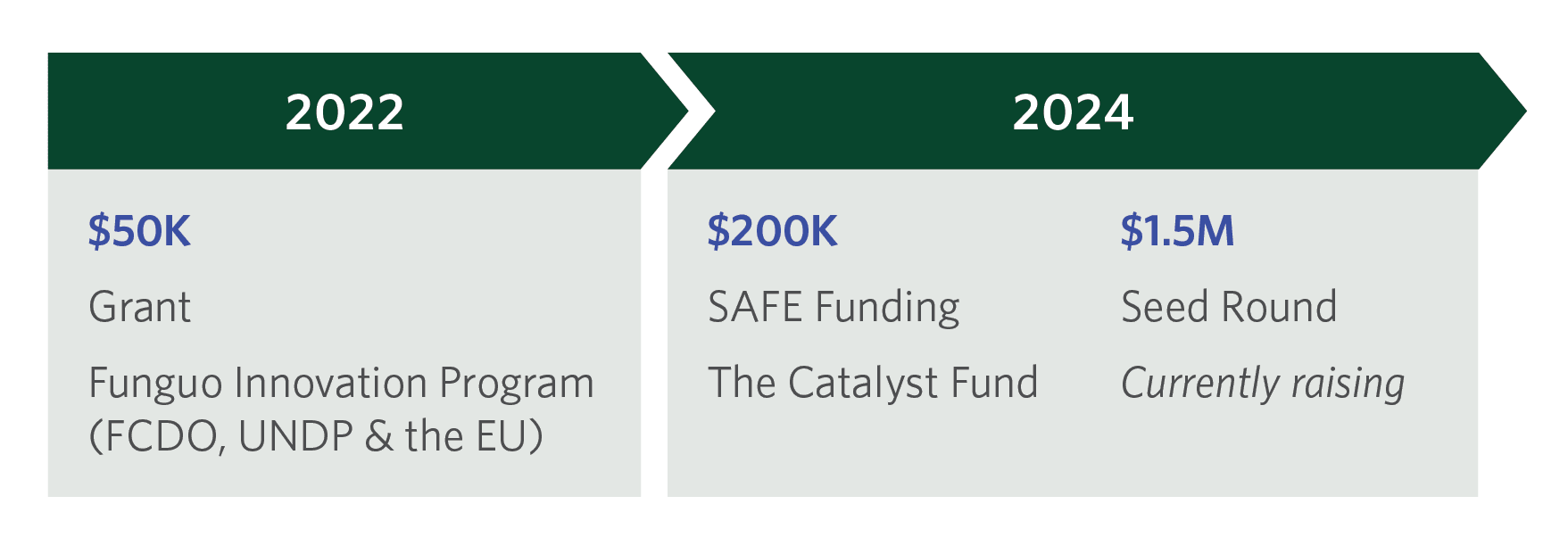MazaoHub was introduced to the Catalyst Fund, incubated by the Global Innovation Lab for Climate Finance, through CLIC’s Agrifood Investment Connector.
When farm management venture MazaoHub was in its beta stage, CEO Geophrey Tenganamba confided in his team, “We are founders in East Africa, where access to capital is limited. Unlike Silicon Valley startups, we don’t have the luxury of extended testing phases.” At the time, MazaoHub’s developers were training an AI model on data collected from soil samples. Today, its app has analyzed over 80,000 soil tests to deliver to personalized farming insights for smallholders across Tanzania.
Now in its growth stage, the climate tech company has secured USD 200,000 in simple agreement for future equity (SAFE) funding from a venture capital fund and accelerator supporting climate resilience in Africa. Supported by the Agrifood Investment Connector (Connector) of the ClimateShot Investor Coalition, MazaoHub is now looking to raise a USD 1.5 million seed round to expand its reach to farmers by manufacturing and distributing more low-cost soil testing kits. Tenganamba says, “The Catalyst Fund investment would not have been possible without CLIC’s support. They are the bridge that lifted us up and helped us take this big step.”
In 2023, the Catalyst Fund was accelerated by the Global Innovation Lab for Climate Finance, a program that fast-tracks innovative financial solutions to accelerate climate investments in emerging markets. “Mazao Hub is an outstanding opportunity because of the team’s deep market knowledge, strong and tangible operational know-how, government partnerships, and commitment to smallholder farmers,” says Karen Serem Waithaka, Chief Investment Officer, The Catalyst Fund. “The company’s growth trajectory, diverse revenue streams, and strategic partnerships are all promising.”

The Connector is CLIC’s platform that supports climate-smart and nature-positive agribusinesses with investment facilitation and impact assessment. Its first cohort works across the agrifoods value chain to reduce carbon emissions and build climate resilience among smallholder farmers in Sub-Saharan Africa. “This is a testimony to Climate Policy Initiative’s cross-team efforts. CLIC will continue to support agribusinesses with climate and nature benefits to engage with investors and access funding, which is critical to expanding their businesses and impact,” says Wen E Chin, Manager, CLIC Connector.
Developed by smallholder farmers
At USD 200 million a year, climate change costs Tanzania’s agrifood sector more than it would to invest in climate resilience, which requires approximately USD 100 million to USD 150 million per year (World Bank). Financing climate-smart agriculture (CSA) is critical to livelihoods in the region, where a single drought or flood can increase food insecurity by 5% to 20% (IMF). A lack of early warning and response systems to climate volatility is outpacing farmers’ ability to cope with these shocks.
In 2021, Tenganamba co-founded Mazaohub Precision Agriculture along with chief technology officer Adelard Urassa to equip farmers with more information to manage climate risks. Their farm analytics dashboard serves over 35,000 smallholder farmers, who dominate Tanzania’s agricultural landscape. With both co-founders hailing from farming backgrounds, Tenganamba says, “MazaoHub is born from our shared struggle. We’re not outsiders, we’re part of the village.” This grassroots knowledge has enabled them to develop a solution that can be customized to different crop and climactic contexts.

Working with a USD 50,000 grant funded by the UK Foreign, Commonwealth and Development Office, the United Nations Development Programme, and the EU in 2022, MazaoHub made over USD 500,000 in revenue in 2023. Following its USD 200,000 SAFE funding in February, the company is now pursuing its USD 1.5 million seed round raise to fund its growth plan to reach a million smallholder farmers by 2027.
Agriculture is like healthcare
The MazaoHub app provides farmers insights into the quality of their soil, as well as advice on precise inputs to improve soil fertility and yields. This is enabled by solar-powered IoT sensors that scan soil samples and link to the app. The sensors collect data on nutrients, moisture, and pH levels to assess soil health and suggest interventions to improve crops’ climate resilience. “Agriculture is like healthcare, we can use AI to provide farmers with personalized, real-time prescriptions, similar to how doctors provide prescriptions,” says Tenganamba.
For instance, the overuse of chemical fertilizers can saturate the soil to unsustainable levels for agricultural production. MazaoHub’s technology helps farmers develop customized plans to shift from synthetic fertilizers to organic alternatives, which have the potential to lower GHG emissions by sequestering carbon in soil. Among farmers it surveyed, MazaoHub’s agronomic advice has resulted in an estimated a six-fold increase in organic fertilizer application and a 30% reduction in mineral fertilizer costs.
Through a partnership with the Tanzania Meteorological Authority, MazaoHub also integrates information collected from the fields with satellite imagery and geospatial data on climate and geographical conditions. This adds another layer of predictive intelligence to the model by including data points on temperature, humidity, wind speed, electro-conductivity, and solar radiation.
By providing climate information services, MazaoHub helps farmers select high-productivity crops based on the weather and terrain in their regions. As per its own analysis, MazaoHub’s crop monitoring services have enabled farms to triple their yield of tomatoes and double yields of maize, a rain-fed crop that occupies a quarter of Tanzania’s agricultural land.
Casting spells with science
To overcome the cost barrier for smallholder farmers, MazaoHub leases its soil testing kits to its network of Kliniki za Kilimo (“agricultural clinics” in Swahili) run by local agribusinesses and farmers’ cooperatives. At a cost of USD 10 per acre, farmers can have their soil samples analyzed at these centers in under five minutes. MazaoHub has conducted nearly 80,000 tests through this tech-and-touch model, by which farmers can access in-person advice from extension officers and agronomic experts.
Tenganamaba recalls that after a bad harvest, his brother-in-law had sworn to quit farming. He was convinced that his neighbour had performed witchcraft on his maize crop, because his harvest had failed, while his neighbour’s had flourished.
Upon testing a soil sample from his brother-in-law’s fields, Tenganamaba discovered that the pH levels were too low for maize production. To neutralize the alkalinity, the MazaoHub app recommended that lime juice be added to the fields. After applying the recommended dosage, the crop rebounded in the next harvest. “Now he no longer believes in witchcraft,” Tenganamba smiles.
Please contact CLIC (clic@cpiglobal.org) for more information on MazaoHub and the Lab (lab.cpi@cpiglobal.org) for more information on The Catalyst Fund.

